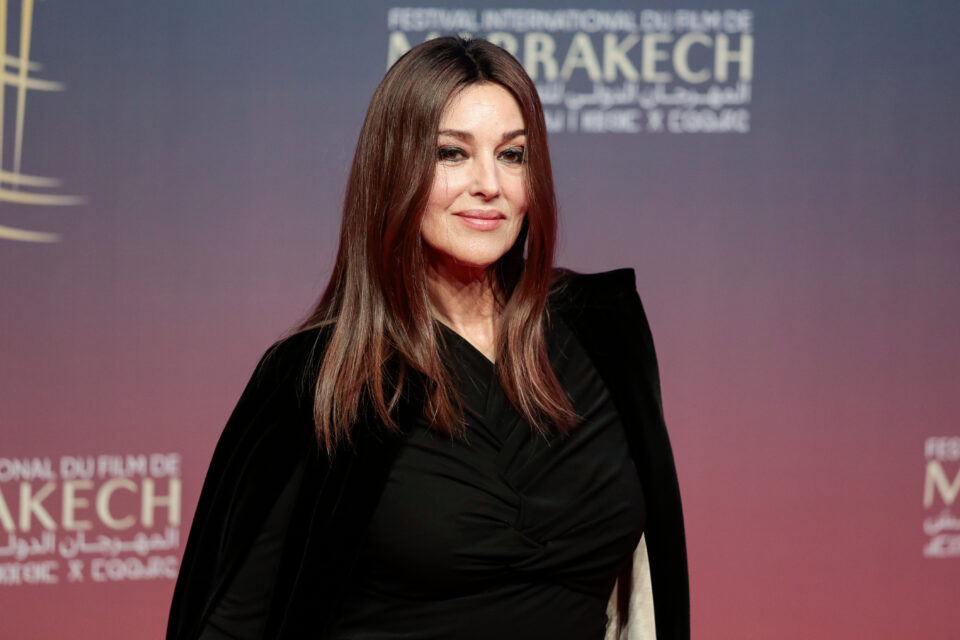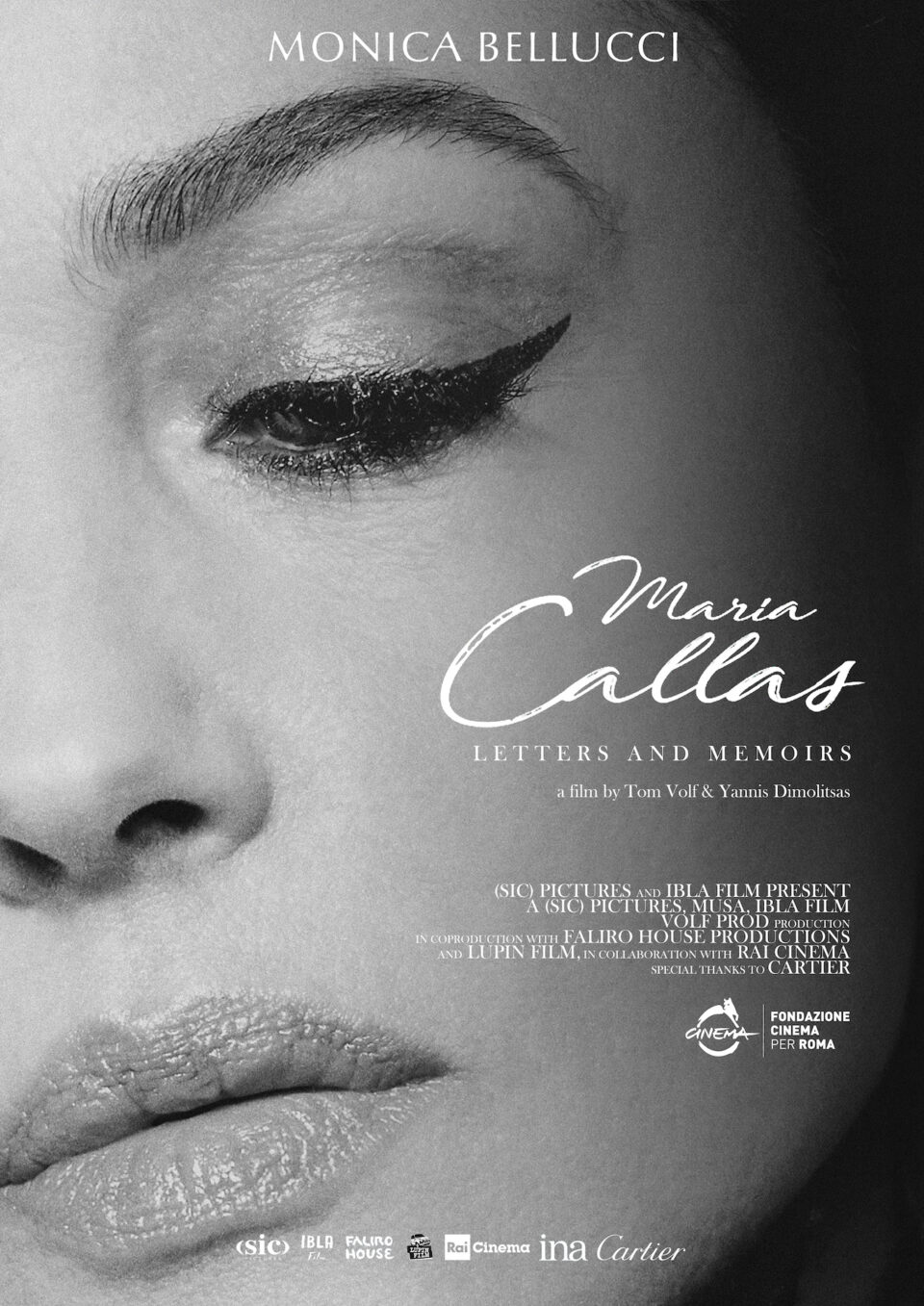An Afternoon with Monica Bellucci
The Italian diva was on hand at the Marrakech International Film Festival in Morocco to screen and talk about her new film and play based on the tumultuous life of legendary opera singer Maria Callas

Monica Bellucci attends the Opening Ceremony of the 21st Marrakech International Film Festival on November 29, 2024 in Marrakech, Morocco. Photo: Antoine Flament/WireImage
“Aristo, my love,” whispers Monica Bellucci into a phone. “I love you, body and soul.”
It’s January 1968, and Bellucci is sitting on a bed in a Paris apartment that once belonged to the legendary American-Greek opera singer Maria Callas.
The camera hovers close to Bellucci’s exquisite face, almost caressing her silken hair, and watches as she lies down and continues whispering to shipping magnate Aristotle Onassis, who is at the other end of the phone.
“I feel privileged to have reached the highest level in a difficult career. I thank God for bringing us together. Try, oh please try, to keep us united forever. I so need your love and respect… I am yours. Do what you will of me,” she says, sounding like the “caged little bird” that Callas often called herself.
A few months later, Onassis invited Jacqueline Kennedy, the widow of John F. Kennedy, to his yacht, and the two got married on his private Greek island, Skorpios. This altered the life of Maria Callas once again, the superstar soprano that Onassis had been in a nine-year relationship with.
Italian actress Monica Bellucci, 60, says she took on the challenge of playing Callas, the prima donna who famously said, “I have the voice of an angel,” because she was moved and inspired by Callas’ talent and courage.
But it was really the duality, that deadly combination of talent and tragedy, that piqued Bellucci’s curiosity and ambition and pulled her towards playing Callas, first in a play, Maria Callas: Letters and Memoirs, directed by Tom Volf, and then in a film about the making of the play.
“Maria Callas followed her heart and tried to be free,” Bellucci, dressed in an all-black ensemble, said in French during a conversation after the film’s screening. “She was like a lost child yearning for love because deep down she didn’t really live life.”
Talent and tragedy alone, on their own, are single-note and dull. But a combination of the two adds mythical dimensions to characters, elevating them and putting them in an existential, epic battle against fate, and turning a simple story into cinematic gold that attracts the best writers, directors and actors.
The play was staged worldwide for three years beginning in 2019, and director Yannis Dimolitsas’ 70-minute, black-and-white film on its making—Maria Callas Monica Bellucci: An Encounter—was screened at the famous YSL Museum during the ongoing Marrakech International Film Festival in Morocco.
Two women who could not be more different
Born in 1923 in New York to a mother who realized her daughter’s talent early and pushed her into singing at the age of 13, Maria Callas found fame and joy in her professional life, but her personal life remained a source of constant sorrow and loneliness.
Nicknamed La Divine (The Divine) for her voice that “swirled and danced like a flame,” Callas was considered one of opera’s most revered singers but was more often in the news for her personal life that, from her childhood to her death in 1977 at the age of 53, was tragic and marked by betrayal.
Her parents exploited her. Giovanni Battista Meneghini, her husband and impresario, stole from her, and Onassis was violent and eventually ditched her for Jackie Kennedy.
Yet Callas, whose 1962 performances of Giacomo Puccini’s three-act opera Tosca at Covent Garden, London, have been described as among the greatest opera experiences of all time, was ready to quit her singing career for Onassis when she was at the peak, although Onassis reportedly drugged her for sexual reasons.
She openly expressed her sense of betrayal at Onassis and Jackie’s wedding, saying, “She did well, Jacqueline, to give a grandfather to her children,” but could never let go.
Callas, always glamorous and with perfectly coiffed hair, had a distinct grey, tragic lining to her personality that only got thicker when she resumed her relationship with Onassis a few months after he married Jackie.
She continued to talk of Onassis as the man she loved and maintained that the most important thing for a woman is to have a man of her own and make him happy.
Monica Bellucci, the award-winning Italian actress, Bond girl and model who has been the face of Cartier, Dior, Dolce & Gabbana is a study in contrast. Bellucci’s effervescent beauty is fragile, but none in her personality.
Married and divorced twice, Bellucci, who is now in a relationship with Tim Burton, the American director of films like Batman (1989), Edward Scissorhands and Planet of the Apes (2001), among others, famously said, “For me, as a woman who has had several relationships, virginity is not a value.”
And once, while talking about her marriage with French actor Vincent Cassel, she took a more “European” view of life, saying she preferred “loyalty” and “elegance” over sexual fidelity.
This play of women with two distinct personalities, belonging to two very different times, makes Bellucci playing Callas interesting and, at times, uneasy casting.
A YSL dress, Callas’ voice and the gift of dignity
In the play, a live orchestra on the stage plays pieces from Madame Butterfly, La Traviata, Medea, Norma and Macbeth, and sometimes a recording of Maria Callas’ booming voice takes control of the auditorium. In between, Bellucci sits on a sofa and reads out the opera singer’s unfinished memoirs and letters she wrote to her friends, actress Grace Kelly, and various singers and musicians.
No narrative strings the letters, leaving Callas’ story disjointed and confusing.
Even at the most vulnerable times, Callas’s voice was that of a soprano — sharp and clear, her words often sounding as if they were spoken in bold. But Bellucci speaks in a sexy, husky bedroom voice that is at times breathless and imploring.

In the film, we alternate between watching Bellucci prepare and rehearse to play Callas and watching her on stage. This is interspersed with clips of Bellucci being interviewed about Callas.
Both the play and the film are more focused on Callas’ personal life and less on Callas, the opera singer. But the film is so riveted by Bellucci’s beauty that, at times, it feels like a homage to Bellucci, with Callas as a sideshow.
Bellucci has taken on several challenging and controversial roles in her acting career. In Italian director Antongiulio Panizzi’s The Girl in the Fountain, she played Anita Ekberg, the Swedish star immortalized by director Federico Fellini in La Dolce Vita. She also played Mary Magdalene in Mel Gibson’s controversial The Passion of the Christ. In the French film Irreversible, directed by Gaspar Noé, Bellucci starred as Alex, a woman who suffers a horrific nine-minute-long violent sexual assault in an underpass.
But theatre, Bellucci says, is way more scary and playing Callas gave her stage fright.
“There is something incredibly artisanal in the process of making a play; it’s something I absolutely didn’t know, and it’s something very strong,” she said.
But keen to explore herself as an actor and discover her own abilities, she says she drew strength from Callas’ music and a dress.
“They gave me Callas’ dress, an old Yves Saint Laurent dress, and when I wore it for the first time, I trembled because I could touch her skin.”
“We actors are able to give ourselves little things like that, sometimes for little moments that touch our emotions, so that we can give all that to the public in return. I remember that every time I went on stage, I loved listening to Callas’ music, and suddenly I would feel this force, this vibration that gave me the desire to go on stage with less fear.”
Bellucci is not a great actress, but the camera loves her, and she is poised. Instead of bringing us closer to the characters she plays, she often makes them inscrutable — a little more mysterious and less accessible.
Bellucci doesn’t sing as Callas, and her performance remains more about her than Callas. But she gives Callas that one thing Callas never let go of, even at her worst moments—dignity. It is also interesting that this film comes at a time when there is renewed interest in Callas’s tumultuous life, with Pablo Larrain’s much-awaited Maria, starring Angelina Jolie as the opera singer, which just had its theatrical release and will stream on Netflix, being talked about as a frontrunner for the Oscar for Best Actress.



